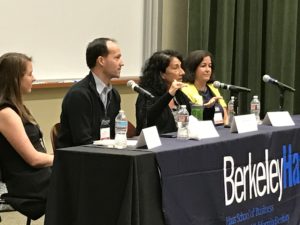
After being rejected by six top schools, Ed Redden reapplied the following year and won acceptances to both Harvard and Stanford’s MBA programs.
Everyone hates rejection, but when it comes in the form of a ding from your dream business school, the disappointment is amplified. You’re already emotionally drained from the application experience, out hundreds or even thousands of dollars in MBA application fees, travel expenses to
visit the schools, or wardrobe updates to impress your MBA interviewers. For many rejected MBA candidates, having to wait another year to start business school feels like pure agony.
Where did I go wrong? What could I have done differently? What does the admissions committee really want from applicants? These questions plague dinged candidates each season, because the schools rarely convey exactly what caused your application to land in the denied pile.
When we met Ed Redden last year, he had submitted six failed applications, but the rejections from Harvard Business School and Stanford Graduate School of Business in particular made him question whether he should even try to apply again.
Yet, he was a compelling candidate. He graduated with a degree in chemical engineering from Notre Dame University in 2013 and has spent the past five years working for General Electric Co. in a variety of roles with increasing responsibility. He leads a group of more than 55 employees across five manufacturing product lines for GE.
Doubts About Reapplying
“There was a lot of self-doubt and questioning about what my future would be,” he admits. “Should I re-apply or focus on the career I already had going? I knew I didn’t put my best application forward, but was it worth it to try again? Did I even have a chance as a reapplicant, or had I blown my chance?”
Many applicants face this crossroads—whether to forgo business school completely and focus on their current career path—at the end of an unsuccessful admissions cycle. No one can answer that question but you. However, the important takeaway is that
one failed attempt does not mean you’ve blown your chance forever.
“During my first round of applications I remember feeling very confused about what it was the adcom was looking for in a good candidate,” Redden explains. “It often felt like admissions was a black box and I was hopelessly trying to crack the code. I knew deep inside that I was a good candidate for top MBA programs and had great experiences that would add value to the classroom. I just needed help telling my story.”
3 Common Mistakes in MBA Applications
Without direct feedback from the admissions committee, you must do some sleuthing yourself to determine what your weaknesses were. After a complete review, we uncovered three common mistakes Redden made during his first time applying that likely hindered his chances at these top MBA programs.
A successful application takes a lot of time and energy. Candidates must really do their homework about the schools they have targeted in order to create compelling essays that convince the adcom how a particular program will help them reach their career goals, and how they in turn will contribute to the school as students and eventual alumni.
Work and personal factors caused Redden to rush his applications, which translated into a generic approach rather than focusing on each school and tailoring the application to speak to that program’s unique culture and values. The third and most consequential weakness, we realized, was with his recommenders. “I didn’t give my recommenders much direction or background,” he admits. “They were not familiar with the MBA application process and had never written a letter of recommendation like that before.”
Guiding Your MBA Recommenders
To remedy this issue when he reapplied, we suggested Redden create a “recommender package,” which offers instruction on both process and content. Provide your recommenders with a list of your strengths and characteristics that you plan to highlight in the application, and since many schools ask recommenders about your weaknesses or areas of development, give the recommender a growth area for you as well as examples of how you’re working on it.
Then the recommender can speak to your maturity and awareness, showing schools you intend to hit the ground running and improve through their program. You want to make it as easy as possible for them to write glowing letters, so a recommender package is a win-win for all. Don’t leave it to your recommender to remember everything you’ve ever done, and definitely don’t leave this process to chance. Your recommenders will appreciate your assistance and thoroughness.
Redden says he devoted much more time and attention to his recommenders during the re-application process. “I chose each recommender for specific and different reasons and worked with them as opposed to throwing it over the fence and simply hoping they wrote a good letter. I was intentional on what aspects of our relationship I wanted them to focus on and what achievements or experiences I wanted them to highlight. The letter they wrote was fully their own but it was much better aligned with my overall SBC strategy as a re-applicant,” he notes.
GMAT Score and Career Goals
Although his career path and goals, and GMAT score, didn’t change from one application cycle to the next, Redden says he adapted a much more honest and authentic approach to the essays, as well as better structure that reflected a strategic focus, the second time around. “Through conversations with my consultant and a lot of self-reflection, I came to better understand what unique experiences and perspectives I brought to the table, how that would best resonate with each school, and how best to highlight that in my application,” he explains.
On the surface, many applicants to elite MBA programs
share similar backgrounds and traits. They’re ambitious, driven, accomplished, and have strong academic records and impressive test scores. But just because candidates share these characteristics doesn’t mean their MBA application essays have to beat the same drum.
When brainstorming stories from your background to share in your MBA essays, you should absolutely include some traditional work stuff. But also think about family, friendships, languages, interests, passions, dreams—categories that are not necessarily “business-y” but that reveal character traits you want to emphasize.
Why an MBA Resume Matters
Redden also created a better, stronger resume tailored specifically for his applications. Just from reading your resume, the admissions team should clearly understand what sort of work stories you’d be talking about in class, or what sorts of “lessons learned” you’ll speak to from either your professional or community-service experiences.
Adcom members have often told us that the resume is just as important as the essays, so the extra work you put into revising it could make the difference between a ding and an interview offer. To pick up some tips for your own resume, check out our resume guide
here.
About his final decision, he says, “I could not make a ‘wrong’ choice, and would have loved to attend either school (or both if I could!). After a lot of self-reflection it came down to who I wanted to be and the type of leader I wanted to become. Both schools would strengthen and develop different aspects of my leadership ability and it was ultimately a personal decision about what school I believed to be the right fit for me.” He chose Stanford and will start its MBA program this fall.
We are grateful to Ed for placing his trust in SBC and for agreeing to share his story. Our hope is that you are inspired to shoot for the stars even if you have failed. You don’t need a perfect 4.0 or an 800 test score. You don’t need to manage a team of 40 people. You do need focus, resilience and the proper strategy.
This article originally appeared as a guest post for our friends at the business school news website
Poets & Quants.
***
If you are looking for guidance on your MBA application,
Stacy Blackman Consulting can help with
hourly and
comprehensive consulting services.
Contact us to learn more. Visit the website for
Stacy Blackman Reviews, and check out the company’s e-publications for more in depth school-by-school guidance.
















 Stanford Graduate School of Business has announced the essay questions for this year’s application, which remain the same as in previous admissions cycles. Stanford has gained significant insight into applicants by asking, “What matters most, and why?” along with “Why Stanford?” These questions are deceptively simple, and the answers are quite revealing.
Stanford Graduate School of Business has announced the essay questions for this year’s application, which remain the same as in previous admissions cycles. Stanford has gained significant insight into applicants by asking, “What matters most, and why?” along with “Why Stanford?” These questions are deceptively simple, and the answers are quite revealing.


